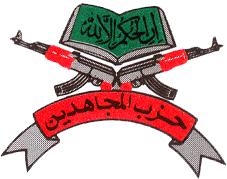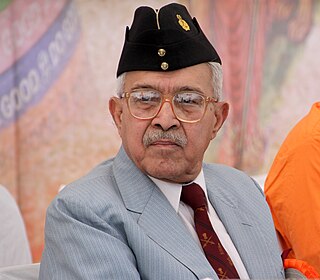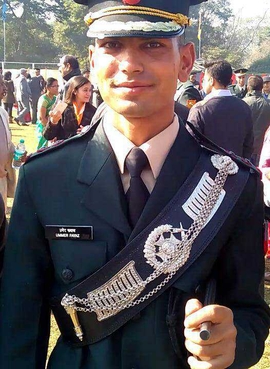
Since the Partition of British India in 1947 and subsequent creation of the dominions of India and Pakistan, the two countries have been involved in a number of wars, conflicts, and military standoffs. A long-running dispute over Kashmir and cross-border terrorism have been the predominant cause of conflict between the two states, with the exception of the Indo-Pakistani War of 1971, which occurred as a direct result of hostilities stemming from the Bangladesh Liberation War in erstwhile East Pakistan.

Ravi Shankar is an Indian guru and spiritual leader. He is also referred to as Sri Sri or Gurudev. From around the mid 1970s, he worked as an apprentice under Maharishi Mahesh Yogi, the founder of Transcendental Meditation. In 1981, he founded the Art of Living foundation.

The Indian Army is the land-based branch and largest component of the Indian Armed Forces. The President of India is the Supreme Commander of the Indian Army, and its professional head is the Chief of Army Staff (COAS). The Indian Army was established on 1 April 1895 alongside the long established presidency armies of the East India Company, which too were absorbed into it in 1903. Some princely states maintained their own armies which formed the Imperial Service Troops which, along with the Indian Army formed the land component of the Armed Forces of the Crown of India, responsible for the defence of the Indian Empire. The Imperial Service Troops were merged into the Indian Army after independence. The units and regiments of the Indian Army have diverse histories and have participated in several battles and campaigns around the world, earning many battle and theatre honours before and after Independence.

Lashkar-e-Taiba is a Pakistani Islamist Salafi jihadist organisation. Described as one of Pakistan's "most powerful jihadi groups", it is most infamous outside Pakistan. The organisation's primary stated objective is to merge the whole of Kashmir with Pakistan. It was founded in 1985–1986 by Hafiz Saeed, Zafar Iqbal Shehbaz, Abdullah Azzam and several other Islamist mujahideen with funding from Osama bin Laden during the Soviet–Afghan War. It has been designated a terrorist group by numerous countries.

Ajit Kumar Doval is a bureaucrat, former spymaster and the current National Security Advisor (NSA) of India. Doval is the longest serving NSA, currently serving his third consecutive five-year term since he was first appointed in May 2014 following the election of Narendra Modi as the Prime Minister of India. He is a former Director of the Intelligence Bureau (IB) and former Indian Police Service (IPS) officer from the Kerala cadre.

Hizbul Mujahideen, also spelled Hizb-ul-Mujahidin, is a Pakistan-affiliated Islamist militant organisation that has been engaged in the Kashmir insurgency since 1989. It aims to separate Kashmir from India and merge it with Pakistan, and is thus one of the most important players in the region as it evolved the narrative of the Kashmir conflict by steering the struggle away from nationalism and towards jihadism.

The insurgency in Jammu and Kashmir, also known as the Kashmir insurgency, is an ongoing separatist militant insurgency against the Indian administration in Jammu and Kashmir, a territory constituting the southwestern portion of the larger geographical region of Kashmir, which has been the subject of a territorial dispute between India and Pakistan since 1947.

Lieutenant General Mohammad Ahmed Zaki is a former general officer of the Indian Army.
The Chittisinghpura massacre refers to the mass murder of 35 Sikh villagers on 20 March 2000 in the village of Chittisinghpura in Anantnag district, Jammu and Kashmir, India on the eve of the American president Bill Clinton's state visit to India.

General Kotikalapudi Venkata Krishna Rao, was a former chief of the Indian Army and a former governor of Jammu and Kashmir, Nagaland, Manipur and Tripura.

The Territorial Army (TA) is a military reserve force composed of part-time volunteers who provide support services to the Indian Army. It consists of officers, junior commissioned officers, non-commissioned officers and other personnel who hold ranks identical to those in the Indian Army, and also maintains civilian occupations. The primary role of the TA is to "relieve the regular army from static duties and assist civil administration in dealing with natural calamities and maintenance of essential services" and to "provide units for the regular army as and when required".

Sardar Farooq Khan is an Indian politician and former police officer who served with the Indian Police Service (IPS). He retired in 2013 as Inspector General of Police (IGP), Jammu and head of the Sher-I-Kashmir Police Academy at Udhampur. Khan is known for the creation of the Jammu and Kashmir Police (JKP) Special Task Force (STF) as well as being its first head in 1995; STF would later go on to be renamed as the Special Operations Group (SOG).
Secession in India typically refers to state secession, which is the withdrawal of one or more states from the Republic of India. Whereas, some have wanted a separate state, union territory or an autonomous administrative division within India. Many separatist movements exist with thousands of members, however, some have low local support and high voter participation in democratic elections. However, at the same time, demanding separate statehood within under the administration of Indian union from an existing state can lead to criminal charges under secession law in India. India is described as a ‘Union of States’ in Article 1 of the Indian constitution I.e "Indestructible nation of destructible states" by its father of constitution Dr. Bhimrao Ramji Ambedkar where a state or Union territory of India cannot secede from India by any means and the Central Government has more powers than the respective state governments and can forcefully change the names and boundaries of the states without their permission at any time when needed for self interest and for the maintenance of integrity.
Human rights abuses in Jammu and Kashmir range from mass killings, enforced disappearances, torture, rape and sexual abuse to political repression and suppression of freedom of speech. The Indian Army, Central Reserve Police Force (CRPF), and Border Security Personnel (BSF) have been accused of committing severe human rights abuses against Kashmiri civilians. According to Seema Kazi, militant groups have also been held responsible for similar crimes, but the vast majority of abuses have been perpetrated by the armed forces of the Indian government.

Burhan Wani was the leader of Hizbul Mujahideen, an Islamist terrorist organization and terrorist group of the Kashmir conflict. He had become a popular figure amongst the local Kashmiri populace, having done so primarily through a strong social media presence, and was responsible for moulding the insurgency in Jammu and Kashmir into a youth-oriented movement. Wani was a terrorist leader and had reportedly recruited numerous foot-soldiers through his personal efforts.

Lieutenant Ummer Fayaz was an Indian Army officer who was abducted and killed in May 2017 by Lashkar-e-Taiba and Hizbul Mujahideen terrorists in Jammu and Kashmir, India. He had been commissioned as a lieutenant in the Indian Army from the Indian Military Academy, Dehradun on 10 December 2016, and was serving in the 2nd battalion, Rajputana Rifles.

Indian Army operations in Jammu and Kashmir include security operations such as Operation Rakshak, which began in 1990, Operation Sarp Vinash in 2003 and Operation Randori Behak in 2020. Other operations include humanitarian missions such as Operation Megh Rahat and operations with a social aim such as Operation Goodwill and Operation Calm Down. The Indian Army works in tandem with the other arms of the Indian Armed Forces and security forces in Jammu and Kashmir such as during Mission Sahayata or joint operations.

On 29 September 2016, teams of Indian Army commandos crossed the Line of Control into Pakistani-administered Kashmir to attack targets up to a kilometer within territory held by Pakistan. The raid occurred ten days after four militants had attacked an Indian army outpost at Uri on 18 September 2016 in the Indian state of Jammu and Kashmir, and killed 19 soldiers. Estimates of casualties from India's cross-border attack varied widely, with figures of 12 to 70 being reported. The Pakistani government eventually acknowledged the deaths of two soldiers and injuries to nine, while one Indian soldier was captured.

Ansar Ghazwat-ul-Hind is an al-Qaeda-affiliated Islamist jihadist militant group active in Kashmir. The group's stated objective is to create Kashmir as an independent Islamic state under Sharia law and to fight jihad against Indian administration of Jammu and Kashmir.

Lieutenant General Baggavalli Somashekar Raju, PVSM, UYSM, AVSM, YSM is a retired general officer of the Indian Army. He last served as the General Officer Commanding-in-Chief South Western Command. He earlier served as the 44th Vice Chief of the Army Staff and as the Director General Military Operations (DGMO).
















